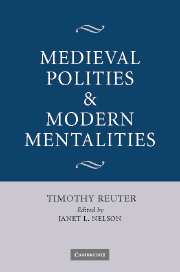Book contents
- Frontmatter
- Contents
- Editor's note
- Acknowledgements
- List of abbreviations
- Editor's introduction
- PART I MODERN MENTALITIES: HISTORIOGRAPHIES, METHODOLOGIES, PRECONCEPTIONS
- 1 Modern mentalities and medieval polities
- 2 Medieval: another tyrannous construct?
- 3 The insecurity of travel in the early and high Middle Ages: criminals, victims and their medieval and modern observers
- 4 Debating the ‘feudal revolution’
- 5 Pre-Gregorian mentalities
- 6 Whose race, whose ethnicity? Recent medievalists' discussions of identity
- PART II THE SYMBOLIC LANGUAGE OF MEDIEVAL POLITICAL ACTION
- PART III POLITICAL STRUCTURES AND INTENTIONS
- Index
- References
6 - Whose race, whose ethnicity? Recent medievalists' discussions of identity
Published online by Cambridge University Press: 12 August 2009
- Frontmatter
- Contents
- Editor's note
- Acknowledgements
- List of abbreviations
- Editor's introduction
- PART I MODERN MENTALITIES: HISTORIOGRAPHIES, METHODOLOGIES, PRECONCEPTIONS
- 1 Modern mentalities and medieval polities
- 2 Medieval: another tyrannous construct?
- 3 The insecurity of travel in the early and high Middle Ages: criminals, victims and their medieval and modern observers
- 4 Debating the ‘feudal revolution’
- 5 Pre-Gregorian mentalities
- 6 Whose race, whose ethnicity? Recent medievalists' discussions of identity
- PART II THE SYMBOLIC LANGUAGE OF MEDIEVAL POLITICAL ACTION
- PART III POLITICAL STRUCTURES AND INTENTIONS
- Index
- References
Summary
The title says ‘medievalists’; but I'm not going to cover the whole of the Middle Ages. I want to concentrate on the period between Late Antiquity (starting, say, around 300/350) and the Great European Shift which lies somewhere between 980 and 1130 and which has been conceptualised in a whole range of different ways we don't need to go into here. As I'll explain shortly, this is a period in which questions of ethnicity have become highly though not universally significant to medievalists. I did a search through the International Medieval Bibliography CD-ROM, as one does, in preparation for this talk, using the obvious keywords, and even after I'd eliminated all the entries where identity was used in a positivist sense and other such ‘false hits’, there were still a staggeringly large number of articles touching on the subject – I'd guess about 800–1,000 in the past twenty-five years. They turn out to have been distributed quite unevenly across Europe, but although, as you will see, that is grist to my argumentative mill, I'm not going to make too much of it without knowing more than I do about the IMB's coverage and selection policy.
Now, setting this in the thematic context of this conference, I'd make some qualifications. Questions of identity and ethnicity have been of considerable interest.
Information
- Type
- Chapter
- Information
- Medieval Polities and Modern Mentalities , pp. 100 - 108Publisher: Cambridge University PressPrint publication year: 2006
References
Accessibility standard: Unknown
Why this information is here
This section outlines the accessibility features of this content - including support for screen readers, full keyboard navigation and high-contrast display options. This may not be relevant for you.Accessibility Information
- 4
- Cited by
